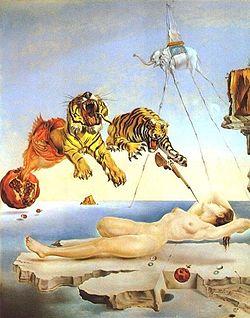Dream Caused by the Flight of a Bee Around a Pomegranate a Second Before Awakening (1944) is a surrealist oil-on-wood painting by Salvador Dalí. A short, alternate title for the painting is Dream Caused by the Flight of a Bee.
In this “hand-painted dream photograph” — as Dalí generally called his paintings — we find a seascape of distant horizons and calm waters, perhaps Port Lligat, amidst which Gala is the subject of the scene. Next to the naked body of the sleeping woman, which levitates above a flat rock that floats above the sea, Dalí depicts two suspended droplets of water and a pomegranate, a Christian symbol of fertility and resurrection. Above the pomegranate flies a bee, an insect that traditionally symbolizes the Virgin.
In the upper left of the painting a fish bursts out of the pomegranate, and in turn spews out a tiger who then spews out another tiger and a rifle with a bayonet that will sting Gala in the arm. Above them an elephant with long flamingo legs, found in other compositions of the period such as Dalí's The Temptations of St. Anthony, carries on its back an obelisk — like Bernini’s Elephant and Obelisk in the Piazza Santa Maria sopra Minerva in Rome.
Salvador Domingo Felipe Jacinto Dalí i Domènech, 1st Marqués de Dalí de Pubol (May 11, 1904 – January 23, 1989), was a prominent Spanish Catalan surrealist painter born in Figueres, Spain.
Dalí was a skilled draftsman, best known for the striking and bizarre images in his surrealist work. His best-known work, The Persistence of Memory, was completed in August 1931. Dalí's expansive artistic repertoire included film, sculpture, and photography, in collaboration with a range of artists in a variety of media.
Dalí was highly imaginative, and also enjoyed indulging in unusual and grandiose behavior. His eccentric manner and attention-grabbing public actions sometimes drew more attention than his artwork, to the dismay of those who held his work in high esteem, and to the irritation of his critics.


No comments:
Post a Comment